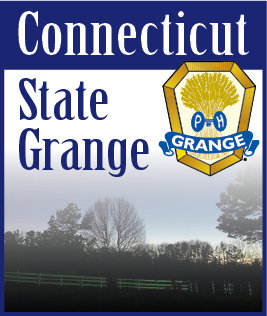| FEBRUARY 22, 2011 -- Ask Nancy Weston why she’s been a member of the Southwick Grange in Massachusetts for over 30 years and her answer is simple.
“We have so much fun,” said Weston, who serves as master (president) of Southwick Grange No. 46.
Weston, along with former Grangers Connie Johnson and Lee Hamberg, first vice president of the Southwick Historical Society, shared the storied history of the Grange during the Historical Society’s January meeting.
Formed in December 1867, the National Grange is the nation's oldest national agricultural organization, with grassroots units established in 2,700 local communities in 40 states. Its 200,000 members provide service to agriculture and rural areas on a wide variety of issues, including economic development, education, family endeavors, and legislation designed to assure a strong and viable rural America.
The Grange was formed in the years following the American Civil War to unite private citizens in improving the economic and social position of the nation's farm population. Over the past 143 years, it has evolved to include non-farm rural families and communities.
The Southwick Grange was established in 1874 and reorganized in 1921. Members initially met on the second floor of the Dickinson Grammar School, which was located behind Southwick Congregational Church.
Familiar family names like Barnes, Foster, Gillett, Hastings and Holcomb dot the pages of a sign-in ledger for the reorganized Grange’s first meeting in April 1921, when the organization had about 80 members.
“In 1949, when [the Grange] was at its peak, there were more than 50,000 members in Massachusetts alone,” Hamberg said.
Membership was thriving in northern Connecticut, too, as the towns of Suffield and West Suffield each had their own Grange, he said.
For many families, the Grange hall was the go-to place for family entertainment and socializing with friends and neighbors.
“Some of the nicest people [my husband] George and I ever met were Grangers,” said Arlene Hughes, who served as secretary of the Southwick Grange for 19 consecutive years.
Southwick Historical Society member Marion Vecchio joined the Grange when she was 14 years old, on the same night as her future husband.
Today, with farmers accounting for less than 2 percent of the U.S. population, the popularity of the Grange is fading as its members age and young families look elsewhere for entertainment. The Southwick Grange has 15 active members, Weston said.
Southwick Historical Society member Ann Kempf, who joined the Juvenile Grange in her native New Hampshire as a child, said the organization’s dwindling membership is disheartening.
“I have fond memories of a family unit in the Grange,” she said.
But the news isn’t all bad. Kempf said her sister, who lives in Guilford, Vt., said there has been a resurgence of youth interest in the Grange there.
“The young people are coming back,” she said.
Early in the movement, Grangers welcomed women into their ranks with equal voice and voting rights, recognizing their importance to rural family economies and communities.
“When many fraternal organizations were gender specific, predominantly men, the Grange was always open to women,” said Hamberg, whose mother was a charter member of the Russell Grange in 1935.
In fact, the three Graces, which are listed among the Grange’s hierarchy of officers, are reserved for women, Weston said.
The local Grange elects its own officers and controls its own affairs in community matters. The Southwick Grange is proud of its “Care, Share, Wear” project, which involves the knitting and crocheting of hats, scarves and mittens for needy children, and lap robes for the Cancer House of Hope in Westfield and local nursing home patients. The Grange also distributes dictionaries to Southwick third-graders bi-annually in the spring. |
